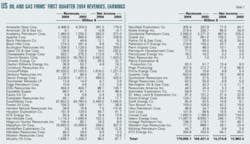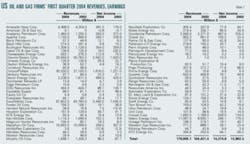US producers, service firms post improved first quarter results
Marilyn Radler, Economics Editor
Laura Bell, Statistics Editor
Increased production and higher oil and natural gas prices improved the first quarter earnings of most US producing companies in a sample of firms. Refining margins also improved for some companies, and foreign currency exchange rates helped to lift net income.
The integrated and independent oil and gas producing companies in Table 1 collectively posted a 2.4% gain in earnings on revenues that were 8.5% higher than in first quarter 2003. The service and supply firms earned 12% more than a year ago and reported revenues up 27% (Table 2).
Collectively, the Canadian firms in the sample announced slightly lower earnings and revenues as compared with the first 3 months of 2003. The producers in this group of companies experienced lower sales prices for oil and gas (see related story, p. 22).
Integrated companies
First quarter earnings results were a mixed bag for the major oil companies.
Although revenues gained, ExxonMobil Corp. reported a $1.6 billion decline in first quarter net income to $5.44 billion as compared with first quarter 2003. This decline came in spite of higher oil production and strong oil and gas prices and because of a required accounting change and a special item recorded in first quarter 2003.
The company's worldwide liquids production increased 5% due to higher production from new fields off West Africa and Norway and the absence of last year's national strike effects in Venezuela, but natural field declines in mature areas partly offset those gains. In fact, earnings from US upstream operations were $1.15 billion, down $105 million due to lower production from mature areas.
ExxonMobil's first quarter gas production decreased to 11.5 bcfd from 12 bcfd in last year's first quarter, reflecting lower weather-related demand in Europe and natural field decline in mature areas, partly offset by the start-up of an additional LNG train in Qatar.
ExxonMobil's downstream earnings were $1 billion, an increase of $281 million from last year's first quarter, even as weaker marketing margins partially offset improved worldwide refining conditions. Stronger margins and favorable foreign exchange rates boosted ExxonMobil's chemical earnings to a 104% gain from a year ago.
Marathon Oil Corp. also saw slippage in earnings. It reported first quarter net income of $258 million. Net income in the first quarter of 2003 was $307 million.
Marathon said that the lower earnings resulted from reduced production due to the company's 2003 noncore asset sales program and lower refining and wholesale marketing margins.
The company noted that with the majority of this year's planned refinery turnarounds already completed, it is well positioned for the heavy US driving season and on target to operate at or above average historic refining capacity levels for the year.
ConocoPhillips, however, reported dramatically improved first quarter results.
Paul Sankey and J.J. Traynor of Deutsche Bank AG said that Conoco- Phillips's net income of $1.58 billion was 12% ahead of the analysts' estimates and up 21% from the first quarter of last year, driven by a bumper quarter for refining and marketing, stronger-than-expected international upstream results, and improved chemicals performance. ConocoPhillips CEO and Pres. Jim Mulva, said, "Our oil and gas production was 1.61 million boe/d, and our refining crude oil capacity utilization rate was 95%." Mulva noted that the company also experienced good results from its midstream segment and that the performance of ConocoPhillips's chemicals joint venture continued to improve.
Regarding exploration and production income, an improvement in the company's results from the first quarter of 2003 primarily was due to higher realized US oil prices and gains on the sale of assets, although higher dry hole expenses partially offset these factors.
ConocoPhillips's first quarter average worldwide crude oil sales price was $30.35/bbl, and the company's worldwide gas price averaged $4.48/Mcf.
Midstream income improved from a year earlier, primarily due to higher equity earnings from Duke Energy Field Services and higher NGL prices and volumes.
Higher US refining margins and volumes drove the improved results of ConocoPhillips's refining and marketing segment, but lower US retail and wholesale marketing margins dampened the gain somewhat.
The chemicals segment, which reflects the company's 50% interest in ChevronPhillips Chemical Co. LLC, showed stronger results, as higher ethylene and polyethylene margins and lower utility costs fueled improvements vs. first quarter 2003.
Amerada Hess Corp. also announced improved overall first quarter results. While upstream earnings increased to $207 million from $120 million a year ago, downstream earnings declined.
Although production volumes were off, the firm's average worldwide crude oil sales price, including the effect of hedging, was $26.83/bbl, an increase of $1.64/bbl from the first quarter of 2003. The company's average US natural gas selling price, including the effect of hedging, was $5.20/Mcf in the first quarter, an increase of 77¢/Mcf from a year earlier.
Amerada Hess's refining and marketing earnings dipped to $112 million in the first quarter from $136 million in the same 2003 period. The decrease reflects lower earnings from retail gasoline station operations and energy marketing activities, partially offset by increased earnings from refining operations.
Independent E&P firms
First quarter results for most of the independent operators in the sample of US companies followed the trend of the majors, with stronger earnings on the back of higher commodity prices.
EOG Resources Inc., though, reported first quarter net income of $98 million. This compares with year-ago net income for the quarter of $127 million. The results for the recent quarter include a previously disclosed $44.5 million loss on mark-to-market commodity price transactions. During the quarter, net cash outflows from the settlement of commodity price transactions were $2.3 million.
EOG's first quarter 2003 results included a $45.2 million loss on mark-to-market commodity price transactions, net cash outflows from the settlement of commodity price transactions of $27.9 million, and a one-time after-tax charge of $7.1 million from a change in accounting principles to adopt Statement of Financial Accounting Standards No. 143 relating to asset retirement obligations of oil and gas properties.
Despite higher sales volumes, Forest Oil Corp. also reported decreased earnings vs. a year ago. The company's oil and gas production expenses increased following the acquisition of properties during the fourth quarter of last year.
Forest reported first quarter net earnings of $19.1 million, a decrease of 51% compared with the corresponding 2003 period, due primarily to increases in depreciation and depletion expense, the company said.
Forest's direct operating expense for the first 3 months was hit by nonrecurring charges of about $5.2 million associated with service-provider terminations and other costs related to assuming operatorship of acquired properties in the Gulf Coast region.
Workover costs included $3.6 million for repairs on wells in Alaska and $2.2 million for workover costs on acquired properties in the Gulf Coast region. Ongoing direct operating expenses were higher due to the acquisition of properties with lease operating expenses that were higher than those of the company's base properties.
For the first 3 months, Forest's sales volumes increased 10% from a year earlier. Gas volumes increased 5%, and liquids volumes increased 16%. Increased price realizations of 9% for oil and 3% for gas combined with higher sales volumes to generate oil and gas revenue increases of 15%.
More typical of E&P company results was Swift Energy Co., which announced a 39% increase in net income—excluding the effect of the adoption of FAS 143 in the first quarter of last year—for the first 3 months.
In the US, Swift's total production climbed 35% from a year ago. The company attributes the rise to successful drilling efforts and a targeted capital expenditure program in the Lake Washington area in Louisiana. Meanwhile, 27% of Swift's total output was New Zealand production.
Swift's average realized US gas price declined 19% from a year earlier, but its average gas price was up 40% in New Zealand. The company's McKee blend crude oil in New Zealand averaged $36.03/bbl during the quarter, an 11% increase from a year earlier. These contracts are denominated in New Zealand dollars, however, which gained strength against the US dollar since the first quarter of 2003.
Refining
US refiners generally enjoyed a strong quarter, marked by robust demand and healthy margins Valero Energy Corp., which owns and operates 15 refineries throughout the US, Canada, and the Caribbean, reported record net income of $248.1 million for the first quarter, compared with net income of $170.4 million for the same period last year.
Valero said that refining operations in the first quarter benefited from higher throughput levels, primarily due to the acquisition of its St. Charles, La., and Aruba refineries, record first quarter refined product margins in all of the company's operating regions, and improved sour crude discounts. Operating income for the company's retail segment fell to $34.7 million from $46.8 million in the first quarter of last year, though, as a result of lower throughput volumes in the Northeast system and weaker US retail fuel margins.
Deutsche Bank analyst Jay Saunders commented that, operationally, Valero seems to have its best quarters ahead as it comes off first quarter turnarounds. Saunders said that runs should rise from 1.9 million b/d in the first quarter to 2.2 million b/d in the second quarter and average 2.1 million b/d for the year, including maintenance in the fourth quarter at Benicia, Calif., and in the third quarter at Paulsboro, NJ, and Aruba.
Murphy Oil Corp.'s refining and marketing operations incurred a loss of $6.4 million in the first quarter compared with a loss of $3.5 million in the same 2003 quarter.
The company's North American refining operations lost $10.5 million vs. a loss of $6.4 million in the 2003 period. Murphy blames the larger loss on poorer performance at its Meraux, La., refinery, which operated at less than optimum capacity during the integration of a new unit and the rebuilding of another unit after a mid-2003 fire.
Murphy's refining and marketing operations in the UK earned $4.1 million in the first quarter, up from a gain of $2.9 million in the same quarter of last year, as operating margins improved during the latest quarter.
Service-supply companies
Among the service and supply companies in the OGJ sample of firms, first quarter results were mixed. Collectively, the group posted a 12% increase in earnings and a 26% jump in revenues.
While some companies such as Nabors Industries Inc., Schlumberger Ltd., and Smith International Inc. reported healthy earnings gains, others, such as GlobalSantaFe Corp., recorded diminished results, and Halliburton Co. incurred a loss for the quarter.
Halliburton's $65 million loss includes a $97 million pretax loss on the Barracuda-Caratinga field development project off Brazil, which has been plagued by cost overruns and delays.
Increased government services work in the Middle East partly offset this loss, though. The company said that its Iraq-related work contributed about $2.1 billion in revenue and $32 million in operating income during the quarter.
Drilling contractor GlobalSantaFe reported first quarter net income of $8.7 million, down from $45.9 million for the same quarter in 2003. Net income for the first quarter of 2003 included $22.1 million from the settlement of a claim filed in 1993 with the United Nations Compensation Commission.
GlobalSantaFe said that the decline in net income for the first quarter primarily reflects a decrease in contract drilling operating income to $15.9 million from $37.1 million in the same quarter of the previous year, as day rates and utilization for the company's rigs in the deepwater market, the North Sea, and West Africa moved lower.
Higher day rates and utilization for the company's jack ups in the US Gulf of Mexico and improved utilization in the Middle East and South East Asia partially offset this decline.


